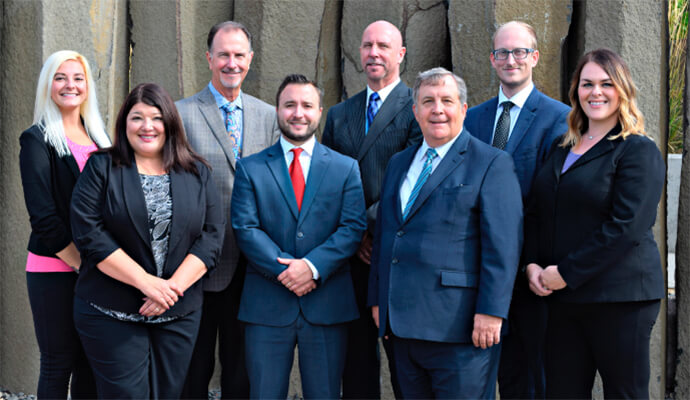Sunnyside Workers’ Compensation Lawyers

If you get hurt at work in Sunnyside, WA, you may be able to file a workers’ compensation claim. Doing so may be difficult. Fortunately, a Washington personal injury lawyer can walk you through the process of filing a claim and getting compensation.
At Calbom & Schwab Law Group, PLLC, we understand the challenges that can come up with on-the-job injury claims. Our workers’ comp lawyers are here to help you in any way we can. To learn more, contact us today.
Workers’ Compensation Laws in Sunnyside
Dating back to 1911, Washington passed “no-fault” industrial insurance laws. These required employers to maintain workers’ comp coverage for employees who performed hazardous jobs. Based on the laws, the employer or their worker did not have to accept responsibility for an on-the-job injury. In this situation, the worker could not sue their employer. At the same time, the worker would be able to get medical benefits and partial compensation for their wages.
These laws were expanded over the years. Today, the Washington State Department of Labor & Industries (L&I) administers workers’ comp benefits. It does so through a public state fund that covers approximately two-thirds of workers. Or, coverage is available through self-insured employers. A small percentage of workers are covered under federal workers’ compensation and other systems for workers’ compensation as well.
Here is a closer look at some of the laws in place relating to workers’ compensation in Washington.
Medical-Legal System
According to Title 51 of the Revised Code of Washington, L&I can administer workers’ compensation benefits. Meanwhile, only the state legislature is authorized to make changes to these benefits.
The state legislature considers many factors relative to workers’ comp benefits, including:
- Community care standards
- Best practices for a particular occupation
- Feedback from advisory committees
These and other factors impact the ways employers help their workers recover from on-the-job injuries.

Types of Claims
If you want to file a workers’ comp claim, you must first find out if your employer is covered under the state fund or self-insured.
For workers who are dealing with an employer that uses the state fund, they must submit a report of accident (ROA) and notify an L&I claim manager.
Comparatively, if an employer is self-insured, you will need to file a Self Insurer Accident Report (SIF-2) and Provider’s Initial Report (PIR).
A workers’ comp lawyer can answer frequently asked questions about the different types of claims and how they work. They can work with you to submit any required information for your claim.
Work-Relatedness
You can ask for workers’ comp benefits only if you suffer an on-the-job injury that relates to your role’s duties.
In Washington, there is a “more probable than not” basis for workers’ compensation claims. Basically, this means you must be able to show it was likely that your workplace injury occurred due to your employer’s negligence — not yours. If you cannot meet the burden of proof to verify your employer was negligent, you may be held accountable for your injury and any costs associated with it.
A workers’ comp attorney considers the facts surrounding your work accident and injury. They may help you submit medical records, witness statements, and other evidence that shows your injury is related to your job. With a preponderance of evidence, you can make it clear that you are in no way at fault for your injury. Most importantly, you can boost your chances of getting the workers’ comp benefits you request.
Limits Based on Medical Necessity and Treatment
When you suffer an on-the-job injury, workers’ comp only covers what is considered to be “proper and necessary.” The definition of proper and necessary depends on your claim.
For example, you may suffer a head injury at work. Your employer’s workers’ comp policy may cover rehabilitation and any other treatments to help you recover from your injury. It may not cover any treatments that do not relate to the injury to your head.
The work injury lawyers at Calbom & Schwab Law Group, PLLC stay up to date on Washington’s laws. We can teach you about these laws and help you avoid legal problems that may come up when you submit a claim for workers’ compensation benefits. For more information, get in touch with us.
How Long You Have to File a Request for Workers’ Comp Benefits in Sunnyside
You have up to one year from the date you suffer a work injury to submit a workers’ compensation claim. This applies to most workplace injury cases. One exception involves a worker who is dealing with an occupational disease. In this scenario, the statute of limitations for filing a claim is two years from the date the worker discovered the illness.
Meet with a workers’ comp attorney as soon as you can after you suffer a work injury. A work injury lawyer makes no assumptions. Instead, they learn about you and your injury. They can help you start a claim and get the best results out of it.

What to Do Before You File a Workers’ Comp Claim
In addition to hiring a work injury attorney, get medical help with your workplace injury. Consult with a doctor, get a medical evaluation, and receive any treatments you need. Organize your medical records and bills, as you may need these to verify the severity of your injury and secure workers’ comp benefits.
L&I points out there are several pieces of information you should collect prior to submitting your claim. These include:
- Information about where the injury occurred
- Contact information of anyone who saw your injury happen
- Your employer’s information
- Information about your wages
- The names and birth dates of your dependents
If you have already met with a doctor, you should also provide this medical professional’s contact information and details about any hospitals or healthcare clinics where you received treatment.
Workers’ Comp Claim Suppression
When you file a workers’ compensation claim, your employer may try to suppress it. They may do so by failing to report a work injury. This is illegal, per the Revised Code of Washington section 51.28.010.
Work injury attorneys take claim suppression seriously. If you believe your employer is intentionally suppressing your claim, notify your workers’ compensation lawyer. You may need to complete a Claim Suppression Complaint. With help from your attorney, you can submit this complaint properly.
Employers That Carry Workers’ Comp Coverage in Washington State
Most businesses in Washington carry workers’ compensation coverage. There are some employers that may be exempt from having it. These include:
- Independent contractors
- Sole proprietors
- Limited liability companies (LLCs)
- A domestic employee in a private residence works less than 40 hours per week
- Gardeners or maintenance workers in private homes
- Children under the age of 18 who do farm work for their parents
- Musicians and entertainers
- Salon workers and make-up artists
In cases where you get hurt at work due to your employer’s negligence but the business does not have workers’ comp coverage, you may have other options to pursue compensation.
As an example, you can slip, trip, fall, and get hurt due to the fact that your employer did not take care of their space. In this circumstance, you may want to file a claim under workers’ comp. If your employer does not meet the criteria for having the coverage, you may not be able to get compensation. Conversely, you may be able to sue based on an on-the-job injury as part of a premises liability claim.
Workers’ compensation lawyers understand why employees file claims. A workers’ compensation attorney will go over every possible legal scenario relating to your case. They will help you figure out the best way to get coverage for any losses you incur due to your employer’s negligence.
Types of Workers’ Comp Claims
Workers’ compensation attorneys get as much information as they can about your workplace accident and injury. There are many reasons why you may get injured at work. These include:
- Electrocution
- Occupational disease
- Injury caused by working with heavy machinery or equipment
- Heat stroke or exhaustion
- Repetitive motions that lead to injuries
Labor and industry lawyers will not force you to settle for anything less than what your claim is worth. They can account for the economic and non-economic losses you incur. These losses may encompass your medical bills, pain, suffering, lost wages, and many others.
Your labor and industries lawyer can help you calculate your losses. They can prepare an argument that shows why you incurred these losses and why your employer should be held responsible for them. If your attorney succeeds, you are well equipped to get the workers’ comp benefits you request.
Workers’ Compensation Benefits You May Be Able to Get
Labor and industry attorneys want their clients to get financial relief. They can explain what workers’ comp benefits may be available to help you achieve this goal. Types of benefits you may be able to receive include:
- Coverage for hospital stays and medical treatments
- Time-loss compensation or money to cover your lost wages
- Loss of earning power if you are unable to return to your prior job in a full- or part-time capacity due to your injury
- Reimbursement for travel to and from your medical appointments
- Vocational services to help you gain skills you can use to secure a new job since you can no longer work your previous one as a result of your injury
- Permanent partial disability (PPD) if you are dealing with a permanent impairment due to your workplace injury
You may also be eligible for death benefits if a family member dies due to an employer’s negligence. A labor and industries attorney can help you request these benefits and any other compensation you may be able to receive following the death of a family member in a workplace accident.
Workers’ Compensation Claim Tips
One of the best things you can do is hire an L&I lawyer. This gives you access to a legal professional who works diligently on your behalf from the moment you file your claim to when you resolve it.
Not all L&I lawyers work the same way. To find one that meets your expectations, schedule a meeting. An attorney can then explain how they can help you with your case. They may also provide recommendations for your workers’ compensation claim, such as:
- Tell your employer. Do not wait too long to notify your employer about your workplace injury, or you risk losing the right to request workers’ comp benefits.
- Complete the required forms. An L&I attorney can help you fill out your forms and make sure they are submitted to the right people.
- Gather evidence. L&I attorneys can help you evaluate medical records and other evidence that may support your request for benefits.
- Prepare for an independent medical examination (IME). If you get a letter requesting an IME, your lawyer can help you get ready for your examination and minimize your risk of doing anything that could compromise your case.
- Be organized. Keep track of your medical bills and other documents relating to your case, as you may need them to show that your employer should be held responsible for your work injury.
Be cautious about anything you do that could put your case in danger.
For instance, you may post photos and videos online after you suffer your workplace injury. This allows you to keep family members and friends in the loop regarding your health and well-being. It also opens the door for your employer to find your content and use it against you.
Remember that pictures and photos preserve evidence, which may work for or against you. If you publish questionable content on social media, your employer may come across it. They may use this to show your injury is not as severe as you claim or did not happen while you were working. This could cause you to miss out on workers’ comp benefits altogether.
Partner with a Sunnyside Workers’ Compensation Attorney
If you need a workers’ comp lawyer in Sunnyside, connect with the team at Calbom & Schwab Law Group, PLLC. Our attorney can evaluate your case. To schedule a consultation, contact us today.
